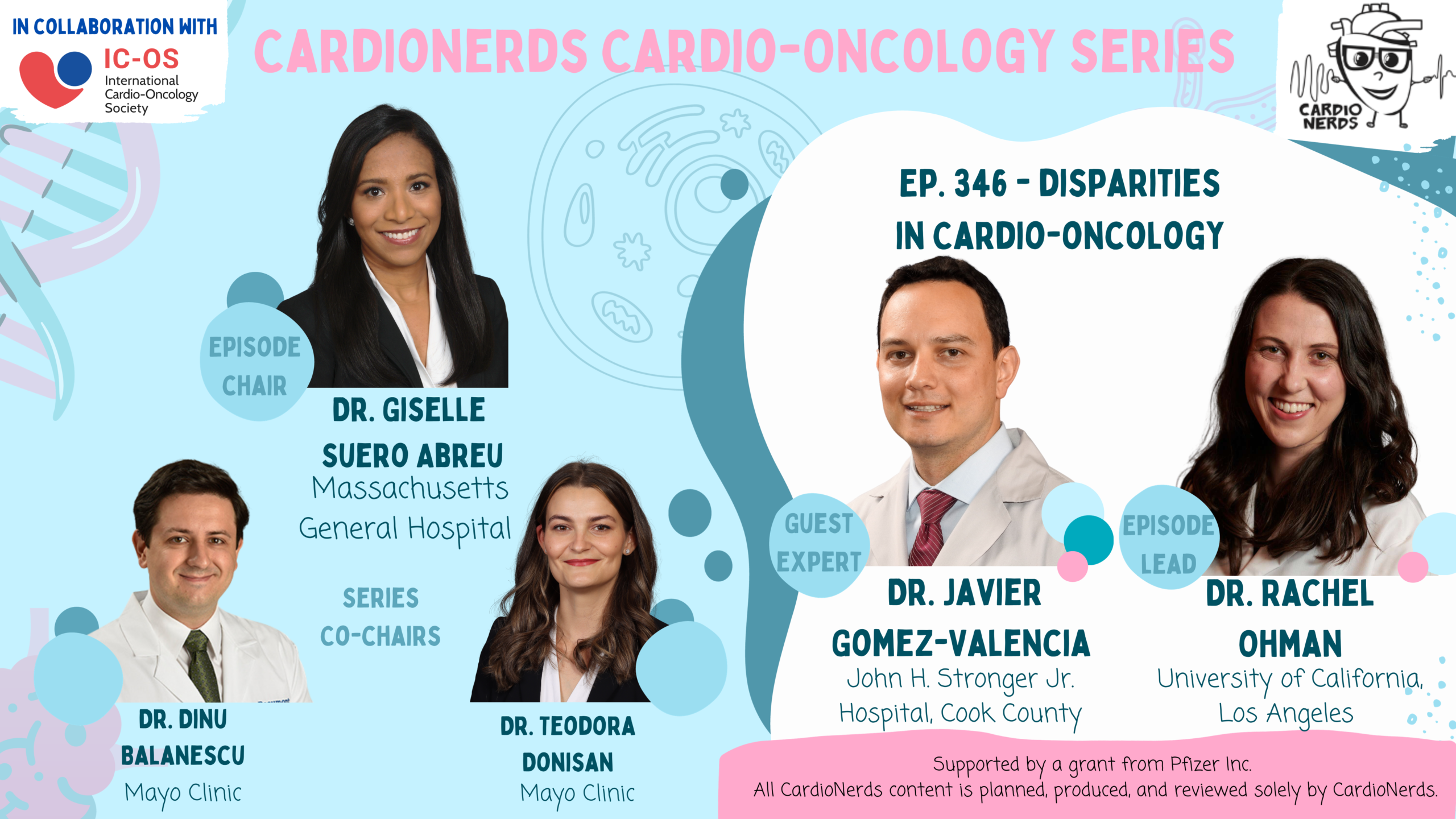Cardionerds: A Cardiology Podcast

357. CardioOncology: Cardiac Tumors with Dr. Juan Lopez-Mattei
CardioNerds co-founder Dr. Dan Ambinder, series chair Dr. Teodora Donisan, and Dr. Sukriti Banthiya discuss cardiac tumors with Dr. Juan Lopez-Mattei, a nationally recognized expert in the fields of cardio-oncology and the director of cardiac imaging at the Lee Health Heart Institute. Here, we explore the topic of cardiac tumors, with a focus on distinguishing between primary and secondary tumors. We delve into the symptoms, diagnostic methods, and treatment options. Show notes were drafted by Dr. Sukriti Banthiya and episode audio was edited by CardioNerds Intern and student Dr. Diane Masket.
This episode is supported by a grant from Pfizer Inc.
This CardioNerds Cardio-Oncology series is a multi-institutional collaboration made possible by contributions of stellar fellow leads and expert faculty from several programs, led by series co-chairs, Dr. Giselle Suero Abreu, Dr. Dinu Balanescu, and Dr. Teodora Donisan.
US Cardiology Review is now the official journal of CardioNerds! Submit your manuscript here.

CardioNerds Cardio-Oncology Page
CardioNerds Episode Page
CardioNerds Academy
Cardionerds Healy Honor Roll
CardioNerds Journal Club
Subscribe to The Heartbeat Newsletter!
Check out CardioNerds SWAG!
Become a CardioNerds Patron!
Pearls and Quotes – Cardiac Tumors
- Keep it simple when approaching an intracardiac mass; start with transthoracic echocardiography (TTE) and use transesophageal echocardiography (TEE) or cardiac magnetic resonance (CMR) based on the clinical context. Use TEE when suspecting valvular vegetations or thrombi & CMR for intracavitary cardiac masses.
- Cardiac tumors can manifest with a variety of symptoms; however, they are more commonly diagnosed as an incidental finding!
- When faced with the dilemma of selecting the most suitable imaging modality for evaluating a cardiac mass, consider the following hierarchy: begin with TTEas the first choice, followed by CMR. If the patient cannot undergo CMR, the next step is cardiac computed tomography (CT) or Fluorodeoxyglucose F18 positron emission tomography (FDG-PET).
- TEE is especially useful for the evaluation of small, highly mobile cardiac masses!
- Imaging cannot substitute a tissue diagnosis of cardiac masses. However, in cases of advanced malignancy, it may not always be necessary.
Show notes – Cardiac Tumors
Segment One: A big “picture” Approach to Cardiac Tumors
Let’s start with an overview of cardiac masses
- Neoplastic vs non-neoplastic
- Neoplastic lesions can be further classified into Primary Cardiac Tumors (PCT’s) & Secondary Cardiac Tumor (SCT’s)
- A majority of PCTs are benign (up to 90%!); however, rarely, they may be malignant.
- SCTs are more common than PCTs, and, by definition, they are malignant tumors.
- Neoplastic lesions can be further classified into Primary Cardiac Tumors (PCT’s) & Secondary Cardiac Tumor (SCT’s)
Now, let’s look at the tools you can use to aid with the diagnosis of cardiac masses…
- Step 1: Investigate the cardiac mass initially with TTE.
- Step 2: Collect clues through history-taking & examination.
- If suspecting valvular vegetations (as in infective endocarditis!) or left atrial appendage thrombus, characterize the mass further with TEE.
- Consider the possibility of metastatic cardiac tumors in patients with a known malignancy, as they are more common than primary cardiac tumors.
- In cases where it is uncertain if the mass is a cardiac tumor or thrombus, use CMR to differentiate the two entities.
- Some findings on TTE that support the presence of a thrombus include left ventricular dysfunction with segmental wall motion abnormalities and/or apical aneurysm as these result in local pockets of stasis (think: Virchow’s triad)
- Some findings on TTE that support the presence of a thrombus include left ventricular dysfunction with segmental wall motion abnormalities and/or apical aneurysm as these result in local pockets of stasis (think: Virchow’s triad)
- If suspecting valvular vegetations (as in infective endocarditis!) or left atrial appendage thrombus, characterize the mass further with TEE.
- Step 3: Put it all together!
- Think about whether a tissue biopsy will be needed. If yes, determine whether a negative margin or open biopsy will be required.
- Think about whether a tissue biopsy will be needed. If yes, determine whether a negative margin or open biopsy will be required.
Segment Two: Symptoms, Symptoms, Symptoms!
Cardiac tumors may be symptomatic and present in the 3 key ways as outlined below (Think COD






 Visit Podcast Website
Visit Podcast Website RSS Podcast Feed
RSS Podcast Feed Subscribe
Subscribe
 Add to MyCast
Add to MyCast